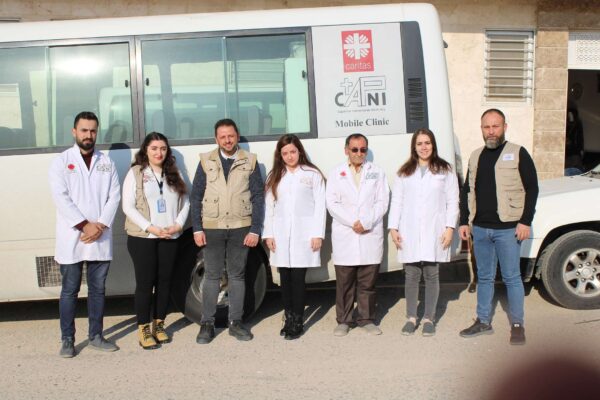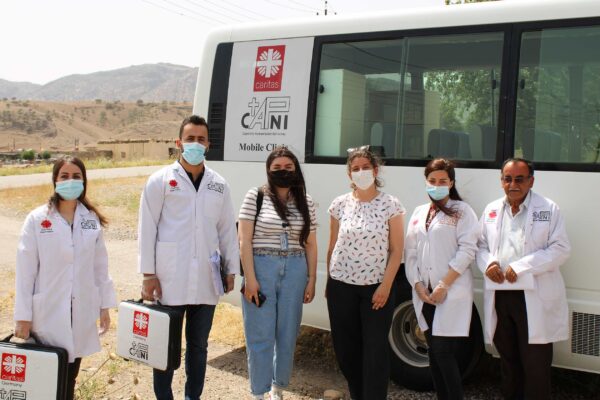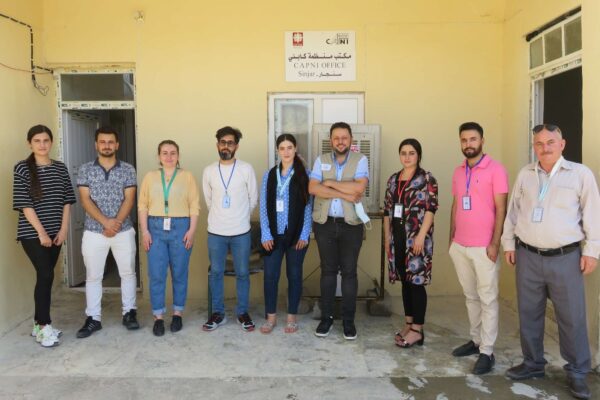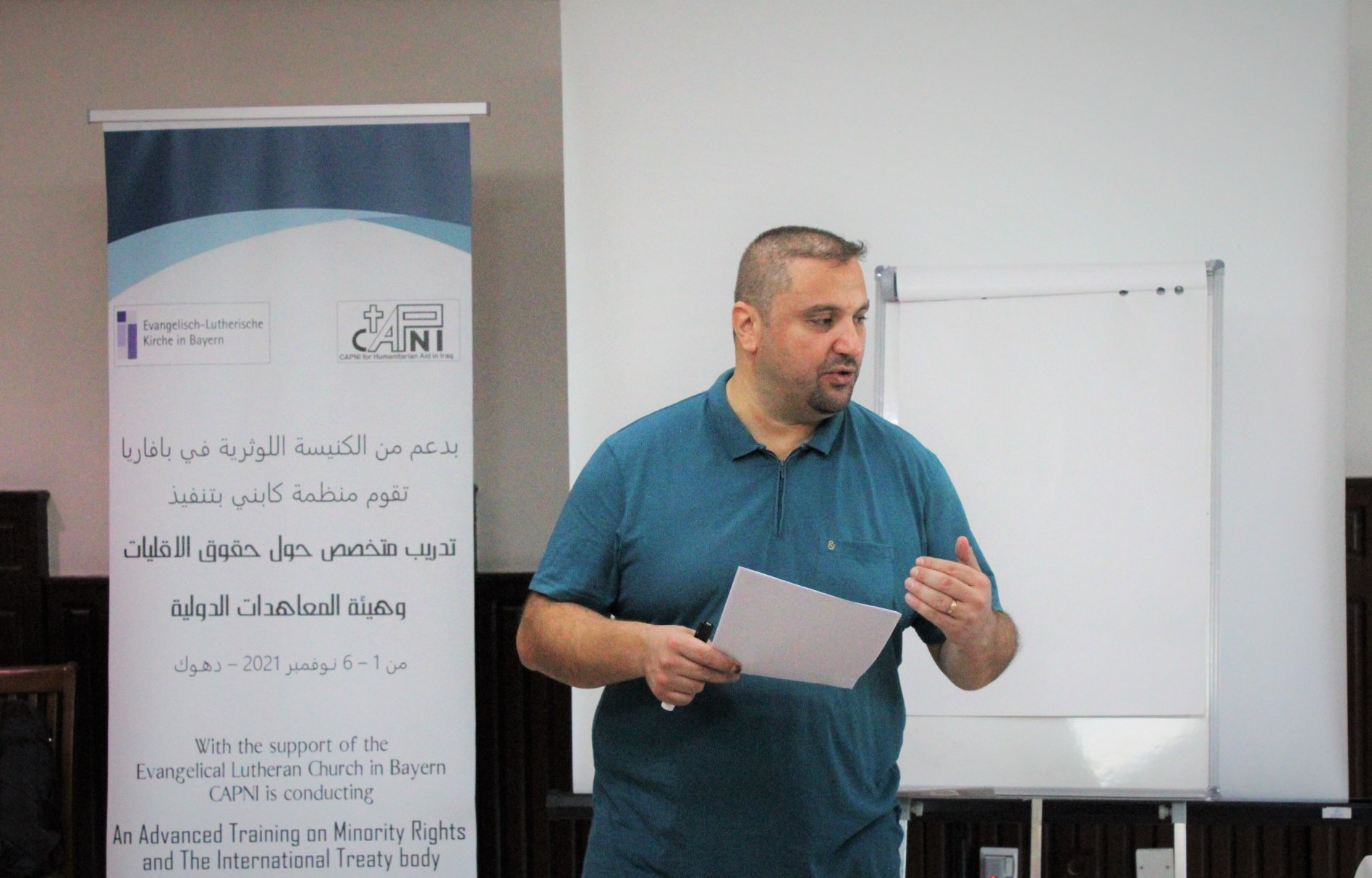The continuity and stability of CAPNI work since 1993 and its commitment to strive to meet the needs of vulnerable communities in various stages and places made it to be a multi-activity organization in multiple fields.
According to the current strategy, which has been concluded and adopted based on need assessment and field studies, CAPNI works in four areas, each of which has its own sector and professional staff.
In addition to these sectors, CAPNI despite its transformation into a development organization, implements relief and emergency programs such as distributions and rehabilitation of houses, schools and churches whenever needed.
What We Do
What distinguishes the areas of interest of CAPNI from the rest of the local and international NGOs working in Iraq is its adoption since its establishment of a special section concerned with the Eastern Christianity identity.
Eastern Christianity sector seeks to preserve the Christian identity of the Apostolic Churches, build their capacities and enhance the spirit of ecumenical work among them in a way that enhances their role in the lives of individuals, families and society, and seeks to promote Syriac language, introduce it, its heritage, protect and disseminate it, and adapt various technical and modern means to achieve this.
CAPNI Eastern Christianity sector plans its annual programs through continuous communication with the churches, dioceses and parishes’ committees to identify needs and priorities in various fields: pastoral aspect, capacity building, equipment, etc.
In its work program for the years 2023-2025, the sector will carry out the following activities
First: Supporting and conducting ecumenical activities
Commitment to implement at least one ecumenical program annually in which Iraqi church families (Church of the East, Chaldean Church, Syriac Orthodox Church, Syriac Catholic Church, Armenian Orthodox Church) participate in its activities, and its activities adopt the ecumenical spirit through participation with institutions concerned with the ecumenical movement.
Second: Supporting the pastoral programs of the dioceses
Support annual pastoral programs for three ecclesiastical dioceses. These programs vary to include youth activities, family gatherings, support for manuscript digitization programs, support for secular Carmel meetings, in addition to preparing ecumenical activities plans.
Third: Instrumenting modern technologies in the programs of Eastern Christianity
Produce at least three videos annually with Beit Kanoo Foundation and post them on social media to promote and encourage Syriac language learning.
Fourth: Introducing Eastern Christianity
Introducing the ecclesiastical and cultural identity, history and language of Eastern Christianity through the publication of three publications annually.
As well as introducing the Kurdish community to the national, cultural and linguistic identity of the Eastern churches through the publication of books (written or translated) in Kurdish in this context.
Do you suggest Eastern Christianity programs to CAPNI? Share with us
With the transition of CAPNI from a charitable organization to an institution whose programs are not limited to responding to the immediate needs, but focus on responding and meeting the future needs of vulnerable communities in order to achieve them to live in dignity with all that this requires from studying the situation and its challenges, extrapolating its indicators and trends, and identifying needs to create a stable living environment, the Community Development Sector has become one of the most important pillars of CAPNI, in terms of the quality of its activities, which are committed to sustainable development through job creation or expansion of facilities and Existing economic activities, or expansion of geographical area of work with a focus on geographic areas that were marginalized or suffered during ISIS control.
In parallel with these activities, the sector is working to develop basic community services in the Christian villages in Dohuk and the Nineveh Plains, as they suffer from weak existing services, most of which need to be rehabilitated and modernized (drinking water networks, irrigation channels, etc.).
In this context, the department encourages community initiatives based on the contribution of beneficiary communities in the implementation of the programs addressed to them by requiring the beneficiary community to take the initiative to identify the need and contribute at least 50% of the cost of the program, while encouraging contributions from the homeland and the diaspora in a step that aims, in addition to its financial benefits for the program, to strengthen the link between the diaspora and the homeland and invest in the material and human resources of the diaspora to support the Christian presence in the homeland.
In all these activities and programs, the department takes into account the importance of the problem of climate change to reduce its effects, especially since Iraq is ranked fifth among the countries most affected by climate change, as the annual plans of the Community Development Sector include climate change programs that include the adoption of clean renewable energy, modern agricultural and irrigation techniques, in addition to community awareness.
CD Action Plan 2023-2025
- Reducing the unemployment rate in the targeted areas by building the capabilities of individuals (for both genders) and developing their skills to qualify them and help them enter the labor market, through vocational courses that will be held in many fields and according to the local market’s need.
- Attempting to reduce the escalating poverty rates in the targeted areas by providing work grants to establish income-generating home businesses, especially for families living below the poverty line.
- Providing financial support for the establishment of small projects, as well as working to support the expansion of existing medium-sized projects with the aim of introducing modern technologies in the field of these projects and enabling them to significantly increase the number of workers in them.
- Contribute in reducing the effects of climate change on various aspects of life through different projects in this field that works on creating a better community and healthy environment, such as clean energy projects and increase green areas project and others.
- Continuing to provide community services to villages and regions that lack these services, as the local community contributes 50% of the cost of establishing these services, such as rehabilitations of drinking water networks, rehabilitation of irrigation canals, and others.
- Working to support marginalized social groups, such as people with special needs or elderly who have no one to support them.
Do you suggest Community Development programs to CAPNI? Share with us
It is one of the main fields of CAPNI work since the formation of the organization in 1993.
The Health Sector assesses the needs of vulnerable communities in the locations and regions where CAPNI works and determines the gaps and needs of health services and submits them in the form of programs to donor partners, and then implements and follows up on approved health projects to ensure that the objectives of the project are achieved according to deliberate standards in health programs.
The areas targeted are selected according to the need assessment and frequent field visits and also by attending periodic meetings of international and local health organizations with the concerned state departments where implemented and planned projects and the most in need of services locations are discussed.
The target groups in health projects are the poor and marginalized communities, focusing on vulnerable groups of women, widows, people with special needs and people with chronic diseases, who live in remote areas that suffer from lack of health and other basic services, regardless of gender, ethnicity or religion.
The Health Sector carries out many medical service programs and activities that include the provision of free basic examination and treatment with the provision of necessary medicines for patients of villages, countryside and remote areas in the regions and districts of Dohuk and Nineveh through the mobile medical clinic program.
The sector also has many medical awareness activities through lectures, training courses and home visits to raise health awareness among the community in villages and rural areas.
Health programs also include supporting people with special needs through the distribution of wheelchairs with awareness courses and lectures for their caregivers.
CAPNI Health Sector adopts a three-year strategic action plan based on the need for health services in the areas of Dohuk and Nineveh governorates with a focus on the areas most affected by wars and disasters in the Nineveh Plains and Sinjar District.
The Health Sector’s strategic plan is in line with the United Nations Sustainable Strategic Goals, specifically the third goal, which is “Ensure healthy lives and promote well-being for all at all ages”.
Do you suggest Health programs to CAPNI? Share with us
The formal structure of the advocacy sector in CAPNI was formed to work on the rights of minorities and marginalized communities, which are reflected in CAPNI vision and mission and its programs with the aim of providing a decent life that achieves justice and well-being and respects the human dignity of minorities and vulnerable communities in a spirit of sharing and respect for diversity. Advocacy activities have been an essential part of the organization’s work since its establishment, as the organization has been the voice of the voiceless through participation in activities and conferences at the national, European and international levels, including the activities and conferences of the European Parliament, the United Nations and others, to introduce the Iraqi minorities and the challenges they face.
Guidelines of CAPNI Advocacy Work
- Recognize, accept, come-to-know and publicize ethno-religious and cultural diversity.
- Respect for identity characteristics and the values and norms of the diverse societies.
Advocacy Department's Action Plan 2023-2025
- Preparing and publishing reports/studies that analyze the situation of Iraqi minorities and the challenges they face, assess their needs and make recommendations to address them.
- Contribute to the drafting and/or submission of two new laws/resolutions or amendments to the legislative and executive authorities of Iraq federal government and/or the Kurdistan Regional government to support freedom of belief and minority rights in cooperation with other local and international partners.
- Produce and disseminate audiovisual content to publicize Iraq’s ethno-religious and cultural diversity.
- Establishing an e-learning platform to hold courses to introduce human rights.
- Address and transform intra-religious and secular dynamics in Iraq to promote freedom of belief, through the establishment of a theoretical reference for freedom of religion or belief, and religious forums in the Nineveh Plains.
- Introducing the diversity of Duhok Governorate by adding the Syriac language to the boards of public institutions.



